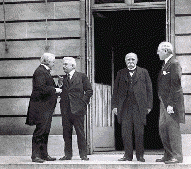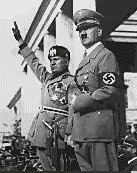HISTORICAL BACKGROUND
1. Introduction
I have always agreed with Ortega y Gasset when he said his
famous phrase "I am me and my circumstances". I have
always believed that the atmosphere in which you grow up
influences you for all your life, as well every experience you
life. Every thing you do has its result, and your soul and mind
are a result of what you do, what you feel, what you think, and
so on. This is why I think it is very important, when analysing a
person, here a writer, that we consider the experiences that
occurred when he lived. Therefore, I am going to sum up the most
important historical events that took place during Huxley’s
life years. I am going to focus this work in the history of Great
Britain and the United States of America, which are the countries
in which Huxley lived during most of his life.
The twentieth century has been a very complicated period of
time; two World Wars, an economic crack, and a number of other
incidents took place in this time. For some Europeans the years
between 1871 and 1914 were some kind of belle époche.
Science had developed a lot and had managed to make life easier
for people. Europe assumed that it had a role in the
civilization, and so colonialism expanded. Even though, there
were some intellectuals like the extraordinary Russian writer
Fiódor Dostoievski, the German philosopher Friedrich Nietszche
or the Austrian Sigmund Freud who criticised this feeling of
optimism towards the human rational capacity.
The Bóer War of England in South Africa took place between
1899 and 1902; it ended when Queen Victoria had already died.
Austria – Hungary, Russia and France suffered from a break
out of Semitic hatred. Due to colonialist interests, the rivalry
between countries grew; there were also some problems with
nationalism, especially, after the German and Italian reunion.
So, to sum up, there was a big number of problems that had to do
with politics and nationalist feelings that were very difficult
to solve. Meanwhile, the working class became more powerful
thanks to the socialist and Marxist political parties. In 1890,
Bismarck wasn’t anymore in the ruling sphere of Germany.
Wilhem II, which was now the ruler wasn’t so efficient as
Bismarck, and, as a result of a series of reasons, Great Britain,
France and Russia made the Triple Entente (before this, the
relationship between Great Britain and Russia weren’t very
positive; Great Britain and France built in 1904 the Cordiale
Entente). Edward VII ruled in Britain from 1901 since 1914. The
Triple Entente was created to face the alliance between
Austria-Hungary, Germany and Italy. The relationship between
France and Germany was very deteriorated, and even more after the
war of 1870-1871. The situation in Europe was very delicate. The
rivalry between Russia and Austria grew, and Germany was
therefore in a dangerous location. Then the incident that without
turnover led into the first World War was the murder of the
Austrian archduke by a Serb, Gavrilo Princip on June 28, 1914.
2. World War I
Great Britain sent an army to France immediately after
declaring World War I to try to stop the German. The number of
deaths began to increase and the European population panicked.
The war was to last very little, just to solve the situation and
relationships between the countries, but, as it always happens,
the war ended up lasting four difficult years, until the last
weeks of 1918. In the end, as a result of this war, the German,
the Austrian and the Russian Empire disappeared, and the bigger
part of the young generation was now dead. Woodrow Wilson, the
United States President, turned out to be a very important figure
in the Conference of the Paris Peace in 1919; he had introduced
U.S.A. in the war against Germany in 1917. While Europe tried to
achieve a democratic situation, this same year, in 1917, the
Bolshevik leader Lenin who was now in power of the Russian
nation, appealed to the European proletarian to fight for the
socialist revolution. France and Great Britain didn’t care
in the moment for such ideological revolution; they were
interested in economic solutions. Therefore, Germany, Austria,
Hungary and Bulgaria had to sign some treatises giving up land.
After the war; Lloyd George, of the liberal party, won the
elections; Britain received as a result of the war some colonies
in Africa. In 1922, the conservative Bonar Law removed Lloyd from
the power.
 Spain remained
neutral during the war; the country was still recovering from the
disastrous 1898. In spite of its neutrality, the Spanish society
was divided into two groups: the ones who supported the allies
and the ones who were in favour of the German.
Spain remained
neutral during the war; the country was still recovering from the
disastrous 1898. In spite of its neutrality, the Spanish society
was divided into two groups: the ones who supported the allies
and the ones who were in favour of the German.
The period between both World Wars was very difficult. There
had been a lot of people dead because of the war and due to an
epidemic flu , which killed twenty million people all around the
world. Even though, some positive things appeared, like the UNO
fundation, the fact that Russia wasn’t anymore under the
dictatorship of the czar, and other aspects of the European
present. During 1929 and some years after, the unemployment grew
a whole lot in Great Britain, who was strongly affected by the
Economic Crack. Still, nationalism and its consequences appeared
as real, and this meant a whole lot of problems that would be
reflected in the Second World War. The Versailles Treatise was
very severe with the German; it established a culprit for
starting WW I, and it was Germany; besides the economic measures
that the French tried to impose were shameful, and Germany
couldn’t manage to pay and obey everything. On the other
hand, the relationship between France and Italy became wore,
because the Italians thought that they deserved more than they
got from the beaten in the war.
Benito Mussolini established a fascist dictatorship in 1922;
he made nationalism grow between the Italian population.
Meanwhile, in Germany, Adolf Hitler managed to achieve power
thanks to the inflation and the economic depression among other
reasons. Stalin, as Lenin’s successor, incited the
nationalistic feeling in Russia. In Spain, monarchy ended after
the elections in 1931. The Spanish Republic had a lot of enemies
among the anarchists, the fascists and the church. In 1936, the
Spanish Civil War broke out; Spain was completely divided into
two sectors; the right – and the left winged. The war
finished in 1939 with the victory of the general Francisco
Franco, who had the support from two very important and powerful
men: Hitler and Mussolini.

3. World War II
To solve the political and economic problems in Europe, France
and Great Britain used the apeacement politics, with Neville
Chamberlain leading it. France and Great Britain declared the war
to Germany, the World War II began, the German army was very
powerful and began taking up land and countries. After 1941, when
Hitler ordered the invasion to the USSR. and when Japan set out a
number of bombs over Pearl Harbor, Russia, the U.S.A. and Great
Britain (with Churchill, Stalin and Roosevelt) joined to try to
make Germany stop its nazi and cruel politics. On spring of 1945,
Hitler committed suicide and Germany lost. The Labour Party of
Britain won the general elections of 1945 with an absolute
majority. The government tried to improve the social situation
during the time they ruled.
4. 1945-1964
After both wars, Europe was in a deplorable situation; the
USSR and the USA were going to be the most important countries in
the next years, increasing the rivalry between them, so that, in
the end, the Cold War took place. Germany was divided in 1949
into Occidental and Oriental Germany; this meant the division of
the continent. Communism started to gain importance in Oriental
Europe, so the USA secretary, George C. Marshall set on a plan
(Marshall Plan) to help the economic recovery of Europe. This was
rejected by the governments of Oriental Europe, which were under
the influence of Soviet power. On the other hand, West Europe
started an extraordinary economic improvement. Apart from this,
the NATO was created, and, this way, West Europe depended more
from the USA (Great Britain joined NATO in 1949). The
conservatives ruled in Britain from 1951 until 1964, but
didn’t undertake important changes. France and Great Britain
were forced to lose their empire. There was a big movement of
descolonization during the two first decades after the war. The
English Commonwealth lost importance. This decadence of
imperialism reflected the lamentable situation of Europe, that
had no political nor economic power. It wasn’t a time of
hopes in Europe; Jean Paul Sartre reflected this with his
philosophy; existentialism.
Even though the power of the USSR in East Europe, they
couldn’t manage to avoid nationalism. In 1956, the
Hungarians fought against the powerful soviets, in the Cheque
Republic, the communist Alexander Dubcek led an important
movement of liberation.
The USA had a lot of influence over West Europe, and some
people like Charles de Gaulle, the President of the French
Republic V, saw that there was some danger in this strong
dependence. De Gaulle interrupted the French relationships with
the NATO, and started developing its own nuclear armament. The
next step for a collaboration between the European countries and
a separation from the USA was in 1951, when France, the federal
republic of Germany, Italy and the Netherlands joined to
establish the market of coal and steel. In 1957, the European
Economic Community was formed.
Two World Wars, an economic depression and the deplorable
social situation that Great Britain suffered after these events
were the reasons that explain the kind of literature written
during this period of time. Young writers started to criticise
the traditional values of the Victorian society. The ideal way of
criticising was the satire.
Biobliography for this page: Encarta ' 98
© Mireia Ferrandis Pradas
BACK TO INDEX PAGE
 Spain remained
neutral during the war; the country was still recovering from the
disastrous 1898. In spite of its neutrality, the Spanish society
was divided into two groups: the ones who supported the allies
and the ones who were in favour of the German.
Spain remained
neutral during the war; the country was still recovering from the
disastrous 1898. In spite of its neutrality, the Spanish society
was divided into two groups: the ones who supported the allies
and the ones who were in favour of the German. 